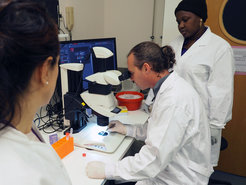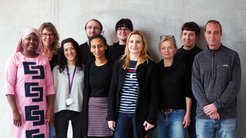World Malaria Day - Vector Biology Hands-On
International Training for Vector Biology Researchers at MPIIB
The Malian doctoral student Assetou Dionégué Diarra and the Argentinean scientist Marcos Sterkel completed a one-week Infravec2 training at the MPIIB. In the Vector Biology Research Unit, they learned the principal techniques for working with malaria parasites in the mosquito vector.
"You must be careful not to destroy the tissues." Giulia Costa points to a monitor to which a stereo microscope is connected. The malaria scientist from the Max Planck Institute for Infection Biology is currently dissecting a mosquito into its individual parts. Assetou Dionégué Diarra and Marcos Sterkel follow the process with fascination. Even at 10x magnification, the highest precision is required to extract without damage the delicate mosquito stomach that contains the malaria parasites.
At the beginning of March the Malian mosquito researcher Assetou Dionégué Diarra and Marcos Sterkel from Argentina were guests in the Vector Biology Research Unit. For one week, they learned many techniques for dealing with malaria parasites within its insect vector: culturing transmitting stages of malaria parasites, dissecting mosquito stomachs and salivary glands, isolating parasites from the mosquito blood bolus and staining them for microscopy. All important steps to successfully analyze the malaria parasite Plasmodium falciparum in the African mosquito Anopheles coluzzii.
Learning new techniques
"Most of the techniques are new to me," explained Assetou Dionégué Diarra, who has already carried out many experiments on mosquitoes at the University of Science, Techniques and Technology in Bamako. The vector biologist is in the final stages of her PhD-project, in which she focused primarily on the microbiome of mosquitoes and studied the bacterial populations in mosquitoes and their habitat in Mali. However, the course is important for Assetou Dionégué Diarra’s actual laboratory activity and for her further scientific career : "I applied for the training because I would like to work with malaria parasites in the future. In addition, I want to pass on the techniques I learned here at the Max Planck Institute to my colleagues".

From mosquitoes to parasites
Marcos Sterkel from the University of La Plata in Argentina has also learned many new things. He has long been interested in insects that feed on human blood and thus transmit diseases. These so-called haematophageous vectors include malaria mosquitoes. "I am investigating how the amino acid metabolism of mosquitoes can be used as a target for insect control. I have noticed that the parasites also develop poorly when the mosquito metabolism is attacked. Now I want to uncover the underlying mechanism," said Marcos Sterkel. For his new research project, he needs a good basic understanding of parasite biology. "A colleague drew my attention to the course at a conference in Liverpool – it was just the right thing for me to start working with malaria parasites".
Infravec2
The parasite training was organized within the Infravec2 program, an international network of institutes and start-up companies in the field of vector biology. Funded by the European Union, the programme enables access to research infrastructures, samples and training in Europe for third party countries, including those that are mostly affected by vector-borne infectious diseases. As such, Infravec2 offers user-tailored training courses in vector and parasite biology.
Elena Levashina's Vector Biology Unit is one of the 24 cooperation partners of the programme. Often techniques and facilities required to study vector-borne diseases are delicate, challenging and costly as they are based on at least three different live organisms: pathogens, insect vectors and their hosts. Many aspects have to be controlled to perform meaningful experiments on a regular basis. As a result, very few facilities allowing these studies exist worldwide.
Infravec2 is born as an initiative to offer vector biologists around the globe a unique opportunity to access such facilities (either by materials, experiments or training opportunities). After the project has been approved by the Infravec2 reviewing committee, the costs are entirely covered by the European Union grant. Meanwhile, other Infravec2 projects aim to harmonize safety regulations and protocols for handling vector insects and their pathogens in the lab at the European level. Taken together, Infravec2 projects promote high standards of experimental reproducibility in the vector biology research worldwide.
Crucial cooperation
International cooperation is crucial in infection biology. Elena Levashina's team has a long-standing collaboration with colleagues from the University of Sciences, Techniques and Technologies of Bamako in Mali, where they together collected mosquito and environmental samples. Analyses of these dense data will require many years of experimental and theoretical research. Assetou Dionégué Diarra contributed to these collections and got to know the scientists of the MPIIB – just another reason for her to come to the institute. However, the impact of the course went well beyond the technical training, says Marcos Sterkel: "The exchange was particularly exciting: I learned how to study the parasites and also saw how the scientists work here at the institute and made new contacts, so important for establishment of future collaborations”.


